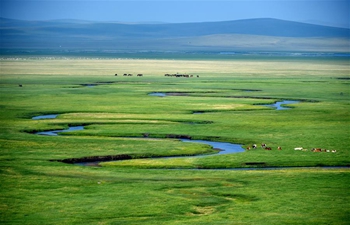SYDNEY, July 25 (Xinhua) -- An international study of shark movements has found that roughly one-quarter of the ocean dwellers' habitat overlaps with fishing operations, raising concerns for the impact on global populations.
A total of 1,681 sharks were tagged during the study, led by David Sims from the Marine Biological Association in Britain and published in the scientific journal Nature on Thursday.
Also on board were researchers from Australia including Associate Professor Charlie Huveneers from Flinders University, who took part in tagging and providing data from sharks along Australia's rugged southern coastline.
Huveneers told Xinhua that the main concern raised in the study regards large pelagic, or oceanic sharks, some species of which are slow to reproduce and have a high likelihood of coming into contact with longline fishing operations.
"When you combine low productivity with an overlap of fishing pressure this can result in population decline and we have seen population declines in several parts of the world," Huveneers said.
The authors suggest a need for more adequate monitoring and management regulations to ensure that population numbers are not being detrimentally affected.
"I'm not saying that sustainable fishery isn't possible, there are plenty of examples of sustainable fisheries for sharks but in the case of pelagic sharks, and in the case of an extensive pelagic long line (fishing), there seems to be a very large overlap."
While the average overlap for the sharks in the study was 24 percent, areas of the ocean that are frequented by protected species, such as white sharks and porbeagle sharks, had even higher overlap with longline fleets - as much as 64 percent.
This provides those animals with limited areas in which they can take refuge from fisheries, and according to the authors, raises the need for measures such as large-scale marine protected areas in key shark habitats.
"The relationship between predators and prey can be quite complex and is often oversimplified. Sharks provide a broad range of ecosystem services both from direct but also indirect predatory effect," Huveneers said.
"This is why we need to ensure healthy populations, not just for the sharks, but also for minimizing the impact on the ecosystems."












